#cbsrmt
Explore tagged Tumblr posts
Text
Episode 39 Review: Pirates of the Caribbean

{ YouTube: 1 | 2 | 3 }
{ Full Synopses/Recaps: Debby Graham | Bryan Gruszka }
Hello and welcome again to my Garden of Evil, today with what I believe may be my shortest entry since last July. This time around, I want to focus on the Raxl and Vangie scenes set in the crypt, because, in my not-so-humble opinion, they’re the only interesting scenes in this entire episode. With even more recap than the average Thursday episode, this one is mostly boring. Hell, even the Lost Episode summary for this one is not that interesting:
If Rev. Matt Dawson refuses to attend Vangie's next séance, he may doom the girl he loves.[1]
I mean, it’s pretty clear that Holly is already doomed, based on the accident in Episode 30, the slashed portrait, and Vangie’s association of her with the Nine of Swords. But I digress.
In the second half of this episode, we do have a telling new revelation about the message that appeared in Raxl and Quito’s writing box following the disastrous séance three episodes ago. It connects to a period of Jacques’ past that the show left mostly unexplored. Yes, today we will be exploring Jacques’ career as a pirate, which was alluded to in Episode 6 and confirmed in this episode, only to never again be brought up on television. So, without further ado, let’s explore what we know of this chapter of the past of THE DEVIL JACQUES ELOI DES MONDES!
*sting and lightning flash*

The original message in the writing box, from Episode 36.
To recap: At the end of the séance, Raxl discovered a message left in the sand of the writing box that she and Quito use to communicate with spirits. She tried to preserve the message with the hopes that the Conjure Woman Vangie Abbott would be able to interpret it once she recovered from the cataleptic trance that Jacques put her in by dropping a chandelier on her during the séance, but this was not to be, because Jacques found the box and obscured the message before Vangie could recover. Now that she has recovered thanks to the potion that he mixed for her, Quito delivers fresh sand to the two priestesses so that Raxl can try to recreate the message from memory for Vangie to read.

Raxl: "When you were in the séance, you did not know when you were in a trance and you did not know that the spirit had warned us that there was an evil presence at that séance. But it was written here." Vangie: "In the ancient language and symbols?" Raxl: "Oh, you know them so well. I read so little. They spoke of the conjure doll and the silver pin which would destroy the Devil and return him to the eternal flame! Where they were hidden, I could not tell. I could not read!" Vangie: "Do you remember the symbols? Try to write them!" Raxl: "May the Great Serpent guide my hand well."

Next scene, after the commercial break:
Raxl: "The first I remember well. I have long known it." Vangie: "A man. Not a real man. A doll, an effigy. An instrument." Raxl: "Symbols have many words, but one meaning." Vangie: "A piercing instrument, but not a weapon. The silver pin!" Raxl: "The first message was left to us by a friendly spirit who came to the séance to save us all." Vangie: "What spirit? I don't remember. I felt only the Devil." Raxl: "What spirit? Perhaps Erica Desmond, whom we sought to summon. Who, at the next moment, might have spoken, had not the Devil interfered." Vangie: "Yes, Erica might well have been there, within a hand's touch of the husband who sought to call on her through me with such agony and grief. I've never felt vibrations of such love and sorrow. There would have to be a response. Erica would be compelled to reply. Raxl, now write the symbols you could not read."

Raxl tries to remember the remaining symbols, but can’t. Vangie tells her to remember, so she searches her memory banks while Holly tries unsuccessfully to convince Matt to quit ministry and become an engineer. Finally, she remembers--or thinks she remembers--something:

Raxl: "Can you read it yet?" Vangie: *shakes head* "Perhaps it was like this?"

Raxl: "I cannot tell." Vangie: "That would be fire. Fire, an all-consuming fire." Raxl: "From Hell? Then it would destroy us all!" Vangie: "No, no, that makes no sense. We must be wrong. We must try again. Think, Raxl!"

Vangie: "No! Raxl, no!" Raxl: "It-It WAS like this!" Vangie: "A vessel of the sea, a great vessel with weapons. A ship that destroys." Raxl: "The pirate vessel of Jacques Eloi des Mondes, when he seized this island centuries ago!" Vangie: "The conjure doll that doomed him wouldn't be on the ancient ship of Jacques Eloi des Mondes."
Athough they rule out this possibility and decide to search the supply boat--unsuccessfully--for the doll and pin instead, this revelation is important. This right here is confirmation not only that Jacques stole the island from someone else back in the 17th century, but that, during his lifetime, he lived as a pirate. And a successful and ruthless pirate he must have been! Back in Episode 6, Jacques told Alison not only that he was a “free looter” (likely a misreading or mispronunciation of “freebooter”) in life, but that “he was the beginning of the family’s true wealth. Legend has it that in the coral caves beneath the island of Maljardin, he buried a king’s ransom, which still lies hidden.”
Originally, we would have learned more about this secret history of Jacques Eloi des Mondes on the show. This Lost Episode summary for Episode 42 describes Jacques as “a French buccaneer,” implying that this detail become important starting in that episode:

Source: Cleveland Plain Dealer (November 7, 1969). I plan on discussing this in more detail in my Episode 42 review.
In 1975, five years after the show’s cancellation, Ian Martin wrote a script for CBS Radio Mystery Theater called “To Die is Forever,” with a premise and characters nearly identical to those of Strange Paradise. (A transcription of the radio play can be found here.) In the introduction, the announcer states that the piece’s villain, Richard the Red-Hand “bought [his family’s island] with the blood money and booty of a hundred pirated ships.” While this method of acquisition differs from Jacques’ alleged conquest of Maljardin, his characterization otherwise remains mostly the same. (Richard does come across as less refined than Jacques and talks more like a stereotypical pirate, but those are minor differences.)
Still, no Strange Paradise-related media provides more backstory about the pirate career of Jacques Eloi des Mondes than Dorothy Daniels’ Paperback Library novels, especially the final installment of the trilogy, Raxl, Voodoo Priestess. Published in August 1970, the novel centers around an attempted invasion of Maljardin by a crime boss named Vidran, which Jean Paul and Jacques team up to stop. The novel draws parallels between this and a similar incident in 1681 when a Spanish armada attempted to take the island:
"It was in August, 1681. Ah, this Jacques was a sly devil. He knew the Armada was on its way. Word had been brought by fishermen who spotted it. Jacques then made haste to transfer from the mainland to Maljardin all of the gold and gems. He buried them secretly and no one was the wiser. He had a friend named Emile, a young man about Jacques’ age. Emile helped him prepare for the invasion and bombardment which was certainly coming. But, according to Jacques’ own writing, Emile was not the strongest man in the world--speaking in terms of character, not physical strength. He was also enamored of a young lady taken prisoner during one of the pirate raids.”[2]
Ian Martin himself later re-used the trope of a wealthy family descended from pirates in his first novel, Nightmare's Nest, published in 1979 under the name of his second wife Joen Arliss. The novel's villain, Jason Greaves, is an illegitimate descendant of the reclusive and aristocratic Rensevelt family who, like the des Mondes, live in a castle on an island and acquired their wealth through pillaging and plundering. According to him, the 17th-century Rensevelts were "pirates, usurers, thieves, murderers, [and] despoilers of women".[3] Later, the family’s kind-hearted heir Ted mentions "the history of my family and the pirates who began and perpetuated it. The lure of gold, the thirst for money, that's the Rensevelt tradition!" (p. 232). Like Jacques, Jason is also tall and dark, oozes sex appeal, and has "that open, free, untrammeled laugh of a man whose conscience is untroubled" (p. 209). So, while there aren’t enough similarities to warrant a full review series for Nightmare’s Nest the way I did for Shadow Over Seventh Heaven last year, it does show some clear SP influence.
There is one other interesting part of this episode that I think I should mention. Raxl seems to have become disillusioned with her partnership with Matt and now wonders if he and his religion are a “disruptive force” on the island:



I know it looks like she’s talking to Vangie in the second screencap, but she’s actually backacting with Matt. Also, “end” in the last image’s subtitle is supposed to read “and.” I’ll never understand why the automatic captions have such trouble with her accent, because I can usually understand her just fine.
Coming up next: Jean Paul and Matt argue over the next séance and I use clues from multiple Lost Episode summaries to determine what happened in the original script for Episode 40.
{<- Previous: Episode 38 || Next: Episode 40 ->}
Notes
[1] Minneapolis Star (November 6, 1969).
[2] Dorothy Daniels, Raxl, Voodoo Priestess (New York: Paperback Library, 1970), p. 108.
[3] Joen Arliss, Nightmare's Nest (New York: Popular Library, 1979), p. 212.
#strange paradise#ian martin#maljardin arc#week 8#episode 39#foxless episodes#review#analysis#cbsrmt#dorothy daniels#ian martin's novels#lost episode summaries#nightmare's nest#paperback library#sign of the great serpent#sp and religion#speculation on ian martin's original story#unexplored plot point#the writing box
1 note
·
View note
Video
youtube
Radio Drama: The Demon Spirit (CBS Radio Mystery Theater)
#HorrorRetrospective#RadioDrama#AudioDrama#OldTimeRadio#OTR#cbs radio mystery theater#Radio Play#The Demon Spirit#Radio Mystery Theater#CBSRMT#Mystery Theater Episodes#Mystery Theater Full Episodes
0 notes
Link
1 note
·
View note
Text
The shepherd radio

#THE SHEPHERD RADIO UPDATE#
#THE SHEPHERD RADIO PROFESSIONAL#
#THE SHEPHERD RADIO FREE#
#THE SHEPHERD RADIO UPDATE#
Christian Education Praise & Worship Talk 30 tune ins AM 720 - 31Kbps Hernando - Florida, United States - English Suggest an update Get the live Radio Widget MORE iOS and Android app. If you're a fan of Thomas Hardy's writing, then check this episode out. The Shepherd Radio - WRZN is a broadcast station from Hernando, Florida, United States, playing Christian, Education, Praise & Worship. After sharing so much of this business with you and baking for so. Each of them played their parts to a T and they were very believable. Posted by Catherine Cramer on May 14, 2021. More importantly, a job well done from our cast: Russell Horton (as William Mills: the paranoid shepherd), Marian Seldes (as Harriet: the Duchess), Ian Martin (as the cruel and jealous Duke), and William Redfield (as Captain Fred Ogbourne). Now you can listen anytime and anywhere Listen to programs such as Turning. Plus 100,000 AM/FM radio stations featuring music, news, and local sports talk. Stream live CNN, FOX News Radio, and MSNBC.
#THE SHEPHERD RADIO FREE#
David Jeremiah, The Alternative with Tony Evans, Financial Issues with Dan Celia, and many more. THE SHEPHERD - Gainesville, FL - Listen to free internet radio, news, sports, music, and podcasts. It was until accidentally falling into it while a student at the Moody Bible Institute. Now you can listen anytime and anywhere Listen to programs such as Turning Point with Dr. Creative storytelling was my passion, but I had never considered radio. The sound effects of the howling wind, the sounds of sheep, hooves of horses galloping, tower bell ringing, and birds cooing did help though. The Shepherd Radio is Central Floridas local station for Christian talk radio. The Shepherd Radio is Central Florida's local station for Christian talk radio. More suspense, more tension, more mysterious tunes to make you feel like you were there witnessing what was going on in the story. An adaptation by Amber Barnfather, with music and sound effects by the Saint Martin Singers. Henry, Guy De Maupaussant, Nathaniel Hawthorne, William Shakespeare, etc., but nothing on this particular writer. Frederick Forsyth's haunting classic Christmas tale, read by Luke Thompson. He has mentioned the lives of other writers like Sir Arthur Conan Doyle, Mark Twain, Edgar Allan Poe, O. But it would've been great if he mentioned Thomas Hardy and his work. THE SHEPHERD - Gainesville, FL - Listen to free internet radio, news, sports, music, and podcasts. Hernando - Florida, United States - English. Christian Education Praise & Worship Talk. Marshall made some good comments about this CBSRMT episode's topic on "the unpredictable", followed by the Stonehenge in Wilshire, England in the 18th Century. The Shepherd Radio - WRZN is a broadcast station from Hernando, Florida, United States, playing Christian, Education, Praise & Worship. #0111-YESTERDAY'S MURDER very attentive in ACT-1 and ACT-2, but not so much in ACT-3. Luke 2:8-12 8 In the same region there were shepherds staying out in the fields, keeping watch over their flock by night. specifically this read as aired on CBC Radio, is a must list. The writing in this Drama-Mystery reminds me of Ep. The Shepherd - Frederick Forsyth - read by Alan Maitland from CBC Radio. All the characters & plot were both interesting, however, the climax & resolution both ended too quickly. Scott Finn, chief executive officer and executive director of West Virginia Public Broadcasting, said the ability to simulcast some programming on WSHC helps solve the problem it has reaching Eastern Panhandle listeners through the state's mountainous terrain.Elizabeth Pennell did a nice job on writing the adaptation of Thomas Hardy's short story from 1881. "Having the show on our campus radio station helps set a standard of excellence for the Shepherd students who comprise WSHC's staff." "'Morning Edition' has grown into the nation's leading radio-news program," he said. Radio station General Manager Mike McGough said adding "Morning Edition" to the WSHC program schedule benefits the Shepherd community. WSHC, which serves Jefferson and Berkeley counties, is an alternative music station produced by and for students on weekdays, and offers an eclectic lineup on weekends produced by local residents. Shepherd has 1 job listed on their profile. David Jeremiah, The Alternative with Tony Evans, Financial Issues with Dan Celia, and many more. Now you can listen anytime and anywhere Listen to programs such as: Turning Point with Dr.
#THE SHEPHERD RADIO PROFESSIONAL#
Listeners of Shepherd University's radio station, 89.7 FM WSHC, can hear additional programming, including NPR's "Morning Edition" and "Mountain Stage," thanks to an agreement between the school and West Virginia Public Broadcasting. View Shepherd Radios profile on LinkedIn, the worlds largest professional community. The Shepherd Radio is Central Florida's local station for Christian talk radio.

1 note
·
View note
Photo

CBS Radio Mystery Theater (a.k.a. Radio Mystery Theater and Mystery Theater, sometimes abbreviated as CBSRMT) is a radio drama series created by Himan Brown that was broadcast on CBS Radio Network affiliates from 1974 to 1982, and later in the early 2000s was repeated by the NPR satellite feed.
The format was similar to that of classic old time radio shows like The Mysterious Traveler and The Whistler, in that the episodes were introduced by host E. G. Marshall who provided pithy wisdom and commentary throughout. Unlike the hosts of those earlier programs, Marshall is fully mortal, merely someone whose heightened insight and erudition plunge the listener into the world of the macabre (in a manner similar to that of "The Man in Black" on yet another old time radio program, Suspense).
As with Himan Brown's prior Inner Sanctum Mysteries, each episode of CBS Radio Mystery Theater opened and closed with the ominous sound of a creaking crypt door, accompanied by Marshall's disturbing utterance, "Come in!… Welcome. I'm E. G. Marshall." This was followed by one of Marshall's other catchphrases, usually either "The sound of suspense" or "The fear you can hear." At the conclusion, the door would swing shut, preceded by Marshall's classic sign-off, "Until next time, pleasant… dreams?" Marshall hosted the program from January 1974 until February 1982, when actress Tammy Grimes took over for the series' final season, maintaining the format.
CBSRMT was broadcast each weeknight, at first with a new program each night. Later in the run, three or four episodes were new originals each week, and the remainder repeats. There were 1,399 original episodes. The total number of broadcasts, including repeats, was 2,969. Each episode was allotted a full hour of airtime, but after commercials and newscasts, each episode typically ran for around 45 minutes.
When repeats of the show were broadcast in the early 2000s, Himan Brown re-recorded E.G. Marshall's original host segments.
1399 episodes
0 notes
Video
youtube
CBSRMT ~ The Dice of Doom 181
0 notes
Video
youtube
Liked on YouTube: CBSRMT ~ A Cup of Bitter Chocolate 1007 https://youtu.be/3reEVwjixmM
0 notes
Text
Shadow Over Seventh Heaven Review, Part I: Last Night I Dreamt I Went to Maljardin Again

Once, April Tennant had been the greatest screen star of all. Even now that this stunning creature was gone, the victim of a hideous accident, her name still cast a magic glow. And nowhere was her haunting spell more alive than within her great walled estate of San Rafael.
It was here that April had lived in her storybook marriage with famed actor Richard Morgan. It was here that her memory was worshipped still. And it was here that lovely young Jenny Summers came as Richard Morgan's new bride--to discover the terror behind the tinsel in this place transformed from a paradise of the living to a hell of the undead.... (inside front cover)
Welcome, fellow Strangers and all others who happen upon this post. This week, I have decided to begin a new series exploring the Gothic novels written by co-creator and first headwriter of Strange Paradise, Ian Martin, under the pen name Joen Arliss. Mostly, the purpose of this series will be to compare the plot and characters of Strange Paradise and those of his novels and what that may indicate about his original intentions for the overarching story of the soap opera.
I got the idea to start this series while writing my review of Episode 26, after the contents of an article referenced in one of the scenes reminded me of the events in this book. On his now-defunct website Maljardin.com, Curt Ladnier covered some of the similarities between “Here Goes the Bride,” the CBS Radio Mystery Theater drama from which this book was adapted, and Strange Paradise, but I wanted to dive deeper and do one of my characteristic overanalyses. So fly with me to the grand southwestern estate of San Rafael and together let’s explore Shadow Over Seventh Heaven--and let me warn you, there will be spoilers for the entire Maljardin arc of SP.
As noted above, Shadow Over Seventh Heaven is an adaptation of a radio drama that Martin wrote for CBS Radio Mystery Theater. CBSRMT is, perhaps unquestionably, Ian Martin’s most famous work. Created by Himan Brown in 1974 and running for 1,399 nightly episodes, Martin wrote a total of 243 (including many adaptations of literary classics) and acted in 255, typically in supporting roles. He continued writing and acting on the series all the way until his death in 1981 at the age of 69. Given my tendency to procrastinate, which sometimes makes it difficult to write just one episode review a week even when I’m not busy, I envy him for being such a prolific writer. I suspect that all the soap scripts he wrote got him into the habit, and he just couldn’t break it.
Even more extraordinary is that he wrote and published five novels during the same period that he worked on CBSRMT. His first was Nightmare’s Nest (1979), an adaptation of the CBSRMT play “The Deathly White Man” (and not the other drama, also by him, of the same name), which is his answer to Jane Eyre and which also has some interesting connections with SP which I plan to explore in another review series. Next came this novel, and then Beloved Victim (1981), adapted from “A Lady Never Loses Her Head,” which I don’t recall having anything noteworthy in common with SP, but I may need to re-read it to make sure. He also wrote two mystery novels, The Shark Bait Affair and The Ladykiller Affair, for the Zebra Mystery Puzzler series, but those are both very rare now and I haven’t yet read either, so I can’t say anything about them. The book Mystery Women: An Encyclopedia of Leading Women Characters in Mystery Fiction does, however, provide some information on their protagonist, Kate Graham, along with short plot summaries. As someone with two trunk novels from the last decade and about fifty pages of a third--which I mostly stopped working on after I started this blog--I also envy him for this. How on Earth did he find the time?
But I digress. Like that of “Here Goes the Bride,” the plot of Shadow Over Seventh Heaven draws heavy inspiration from Daphne du Maurier’s famous Gothic romance Rebecca, but with some major differences in plot and characterization. The novel fleshes out the radio drama some more, adding additional details and plot twists that aren’t present in the original play, which arguably make it more interesting. One gets the impression that he had a lot of story in mind while he penned the original drama, but knew he could only squeeze so much into a 45-minute radio play and so had to leave many of the most interesting details out.
But that’s enough background information. Let’s begin our analysis and see what Ian Martin’s later work can tell us about his original intentions for Strange Paradise.
Introduction
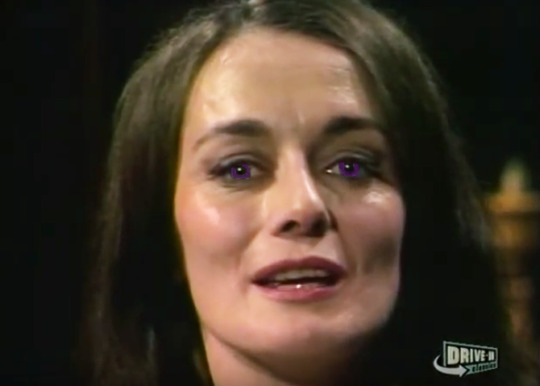
The face is lovely, matchless....
Opening like some gigantic and exotic flower as the camera zooms in...
It fills the screen, flawless, enticing....
The lower lip glistens, pulled away from those perfect teeth, trembling ever so slightly, promising undreamed-of delights for the man brave enough to taste its forbidden fruit....
The skin glows with an inner light....
The eyes beyond the thick fringe of dark eyelashes shimmer with the deep violet of a tropical night....
The pitiless exposé of the camera is defeated, no matter how close it probes in close-up....
This is beauty without blemish....
This is everyman's dream woman--sex symbol of the nation, and most of the world....
This is April Tennant!
Strange to think of her dead, for on the screen she is captured forever in all her vibrancy and stunning beauty....
Impossible to think of her lying, mangled and bleeding on the rocks, while the hungry sea licks out as if to possess her.
Incredible to think of her cold and in the grave. Which she has been for twelve months--or this story never would have begun (p. 5).
The first page of the novel introduces us to April Tennant, this novel’s Rebecca and also its Erica Desmond. Like Rebecca, she is the first wife of the protagonist’s love interest, whose tragic death will cast a shadow over her former estate. Like Erica, she was a famous actress--probably more so than Erica ever was--but the cause of her death is not the same as the alleged cause of Erica’s. In Episode 5 of Strange Paradise, Erica’s grieving husband Jean Paul claims that she died of eclampsia while pregnant with their son, although evidence uncovered by other characters in later episodes leads them to contest that claim. Instead, April’s death resembles that of Huaco, the wife of Jean Paul’s ancestor Jacques Eloi des Mondes who died when she fell from a cliff on Maljardin, Jacques’ island estate.
In this introduction, we also see what will become a theme of the novel: gaze. Not just the male gaze--the obvious POV of the introduction--but, more generally, the viewing of April Tennant almost exclusively through the eyes of other characters, both male and female. We never learn much about her inner life, even as we learn those of Jenny (our protagonist), Richard, and others. April is largely a mystery, a larger-than-life figure of ideal beauty who, in the eyes of the public, is more a legend than she is flesh and blood. It’s the same mystique that surrounds celebrities in real life that often makes other people forget that they, too, are human--if, indeed, that’s what April was. Or is there more to it? I guess we’ll have to find it.
Chapter 1
The first chapter begins with a detailed description of San Rafael--and by detailed, I mean that Ian Martin spends one and a half pages describing its wall, followed by two on the mansion itself. I won’t type out too many passages from this book for copyright reasons--for, unlike Strange Paradise, this book is still under copyright--but I will include some highlights. The wall surrounding the castle “was thick enough at the bottom to withstand any tremor of the California earth...topped by a corona of jagged broken glass and it ran for a mile and three-quarters in a great semicircle away from the rocky Pacific coast and back to it again” (p. 6). On its gate,
The ironwork swept and swirled in great balanced curlicues, and the frame was heavy and studded. The studs held great sheets of blackened steel, heavy enough to withstand a battering ram, blocking any vision of the grounds the wall concealed. And the vertical members of the scrollwork reared high above the frame of the door and the top of the wall in a bristling array of spikes, sharp as swords, arched forward to further discourage any hardy trespasser who might try to climb their height (pp. 6-7).
In case you haven’t already figured it out, Martin loved his purple prose. If you don’t like Byzantine descriptions of architecture, ironwork, clothing, or anything else, you probably shouldn’t read this book or any of Martin’s other novels. (Nightmare’s Nest is far purpler, however, than this one. There’s an entire chapter in there devoted to describing the protagonist’s lush Edwardian finery.) Fortunately for me, I love this kind of thing and will gladly devour description after description of gates covered in iron curlicues. My literary tastes tend toward “more is more” and I’m not ashamed to admit it.
We learn that San Rafael is a reconstruction of an old Spanish mission, commissioned by April and built in part by Richard himself, “who personally took charge of putting in all the glass that fronted on the sea.” The gardens that surround it give it “a riot of color--bougainvillea, hibiscus, passionflowers, trumpet vines--all enhanced and set off against the majesty of rows of carefully spaced Italian cedar, or Lombardy poplar” (pp. 7-8).
Despite all this radiant beauty--and as one might expect for reconstructed ruins from the era of Spanish colonialism--the estate is believed to be cursed, at least by “the superstitious peons who built the walls” (p. 9). (That’s what the book uncharitably describes the Mexican builders--some parts of this book haven’t aged well, as you will see.) Two men died while rebuilding it, followed by April herself around a decade later.
Surprisingly, we learn at the end of this chapter that Richard Morgan’s background differs from that of Jean Paul Desmond. An actor himself, he “was king of the theater, and of East Coast entertainment. Their marriage was a royal one, and it vaulted both of them to new and undreamed-of heights of popularity” (pp. 9-10). It was this popularity that drove them to wall themselves in at San Rafael and use the police and guard dogs to keep rabid fans and paparazzi away--which, ultimately, didn’t work and only led to “a new wave of interest and snooping” (p. 10).
Chapter 2
Here we meet Richard’s sister Lisa, who is...well...quite an interesting character. She’s a beautiful woman with short hair, a deep voice, and--most importantly--an unusual, creepy level of attachment to her brother.
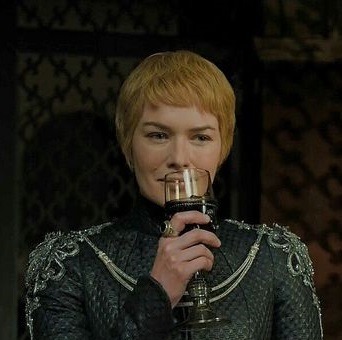
Cersei Lannister Lisa Morgan.
Lisa has just received a phone call from the Philippines where her brother is. The call has left her “literally stunned” (p. 11), which means that the modern slang meaning of “literally” dates back 30+ years longer than I thought. Surprisingly, she isn’t drinking wine to calm her nerves like Cersei above, but that’s her loss.
As she gazes at the ocean to the west, her housekeeper, Conchita Aguilar, enters. Chita (as she is usually called) has not just worked as April’s housekeeper for most of her life, but also "she and her husband, Juan, had quite literally brought up April” (p. 13); as a result, she is fiercely loyal to the family of her deceased mistress. Here is a portrait of her:
Looking at the tiny woman with her bright button eyes, the black Indian hair swept stiffly away from her face, parted in the middle and tidily put away in a tight bun low on the back of her neck, Lisa was surprised at the sudden urge to go and take this familiar person in her arms--or better still have Chita take her in hers.[...]Chita might be tiny, but she was all steel and whipcord (p. 13).
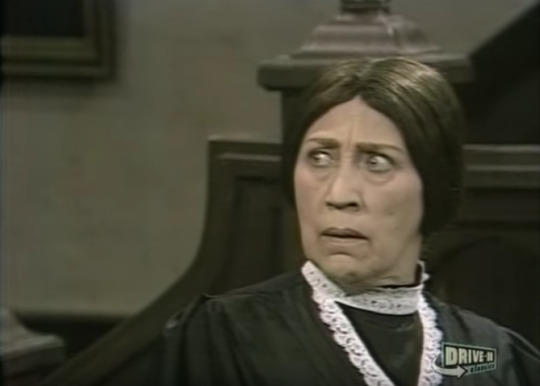
Sound familiar?
Yes, Chita bears a resemblance to our beloved Raxl. They even have a similar background, for Raxl, too, comes from a people indigenous to Mexico, according to Episode 23. Like Raxl, Chita is very old and has a mysterious magnetism that draws some people to her (which, in Raxl’s case, includes me). There are some minor differences--Chita doesn’t worship the Great Serpent, she uses gratuitous Spanish instead of gratuitous French, she has a living husband and grandson--but they are, in most ways, the same character. It’s clear that Ian Martin didn’t want to part with Raxl, and I don’t blame him one bit.
Also, for whatever reason, he was oddly insistent on both of them having a specific hairstyle. If you read the original script for the show’s pilot, you will see that he was almost as specific about Raxl’s hairstyle, mentioning “her hair tightly drawn over her ears to a small bun,” but less detailed about those of the other characters. Just an odd detail that probably bears little significance, but that I noticed.
Lisa tells Chita that Richard is on his way home with a new wife, a young, very wealthy orphan named Jenny Summers whom he met in the Philippines. This angers the ancient housekeeper, who argues that Jenny can never come to San Rafael
Because there is no place for her here--en la casa de La Señora! Everything here is hers--she still lives here, and will always live here. Her perfume is in every room, her pictures are everywhere, every ornament and ashtray and book I keep just the way she last touched it. There is no room for any other wife here! Oh, she will feel it, she will know it, because La Señora would never permit another woman to take her place (p. 16)!
Lisa insists that, despite the risk that Jenny won’t want to live on the estate and despite her equal displeasure about the situation, Chita keep an open mind regarding her and try not to be such a Mrs. Danvers about the situation. (OK, so she doesn’t actually say the last part; that’s just my paraphrase.) She also tries to pressure Chita into helping her take down the mementos of April at Richard’s orders, which she objects to, both for sentimental reasons and because they don’t have time to have the enormous fresco of April that adorns the former chapel. (Symbolism!)
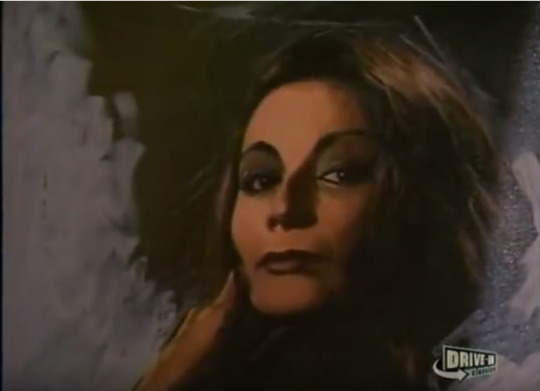
“It was a breathless and yet terrible beauty. For any woman who stood next to it had to be eclipsed” (p. 20).
Yes, you read that right: they rededicated the mission’s former chapel to the silver screen sex goddess April Tennant. After their wedding, Richard had a giant fresco of her painted there in place of its former altar. This is a clear indication that one or more of the people in this household worship April, whether literally or figuratively. More than that, the portrait glows like that of THE DEVIL JACQUES ELOI DES MONDES, and seems, like Jacques’ portrait, to be alive, the living essence of a dead person. “Most haunting of all was the feeling that this was the woman--that she could not have died, that any moment she would step off the wall, and her silver laughter would fill the house again (p. 20).”
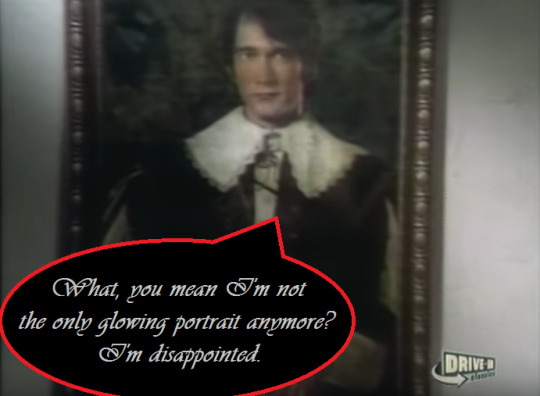
I’m sorry, Jacques. ;)
Coming up next: Jenny arrives at San Rafael and tries to adjust to living on an estate where almost everyone but Richard acts like they hate her.
{ Next: Part II -> }
#gothic fiction#cbs radio mystery theater#ian martin#joen arliss#shadow over seventh heaven#cbsrmt#strange paradise#related media#review#other reviews#ian martin's novels#analysis#gaze#rebecca#speculation on ian martin's original story#symbolism
5 notes
·
View notes
Video
youtube
Radio Drama: Possessed by the Devil (CBS Radio Mystery Theater)
#RadioDrama#AudioDrama#OldTimeRadio#OTR#HorrorRetrospective#cbs radio mystery theater#Radio Play#Possessed by the Devil#Radio Mystery Theater#CBSRMT#Mystery Theater Episodes#Mystery Theater Full Episodes
0 notes
Link
1 note
·
View note
Video
youtube
CBSRMT ~ The Many Names of Death 196
0 notes
Video
youtube
CBSRMT ~ The House of the Voodoo Queen 189
0 notes
Video
youtube
Liked on YouTube: CBSRMT ~ The Secret of Shen-Si 832 https://youtu.be/FZOB5pRcTO0
0 notes
Text
Episode 1 Review, Part I: Welcome to Maljardin
{ YouTube: 1 | 2 | 3 }
{ Synopses: Debby Graham | Bryan Gruszka }
{ Screencaps }
What to write about the pilot? How should I begin the introduction to the first real post on this blog? I don’t wish to write a detailed synopsis, because other people have already done so, and I feel neither the need nor the desire to comment on everything in this episode (or, indeed, in any episode). Also, funnier writers than I have already written detailed reviews of it, and I don’t feel I can compete with them, especially if I focus too hard on trying to be funny. So this will be a different kind of review series, focusing on analysis of what I think is important/interesting instead of recapping everything. And I promise that my other posts won’t be as long as this one. There’s just a lot to cover in this first post.
One of the main questions that I intend to explore in this post series is what makes a TV show “bad.” Obviously, this is purely subjective, and most of what I write will be my silly personal opinion, but we are dealing with a show that many people consider “bad” and that, arguably, is “bad” by most mainstream TV watchers’ standards nowadays. Today, we live in an era where TV dramas have increasingly higher budgets and production values, where viewers expect realistic acting and special effects, where streaming and binge-watching are increasingly the norm, and where making a single continuity error or retcon will inspire scorn from your entire fanbase (and God forbid one of the actors forgets to throw out their Starbucks cup). TV today is almost the polar opposite of TV in 1969, when shows were much lower budget, special effect failures were far more acceptable, and streaming on demand probably sounded more absurd than using science to bring a frozen woman’s body back to life. As such, people today expect different things from television from the soap opera viewers of fifty years ago, and are quick to dismiss a show as bad.
I agree that continuity errors and retcons are signs of mediocre writing, but do high production values and good special effects really matter? Is realistic acting necessary for drama, or can drama be just as effective with artificial, stylized, hammy or campy acting? How do we separate a genuinely bad show from one that is merely dated, or that has a few minor problems? If you ask me, the answer lies in the writing and the effectiveness of the acting--and it is the writing that will be the primary focus of this blog.
The pilot, like the 43 episodes that follow, was written by Ian Martin, an actor-turned-writer for soap operas and later Gothic romance and horror. He is most famous for writing over two hundred episodes of CBS Radio Mystery Theater in the 1970s. (While I only recently discovered CBSRMT and therefore haven’t listened to most of the episodes yet, I can say that those of his that I’ve listened to are very good. I particularly recommend “And Death Makes Even Steven” and “Time and Again.”) For the plot of Strange Paradise, Martin seems to have drawn on his own life experiences: namely, the tragic early death of his first wife, the actress Inge Adams. According to Curt Ladnier, “Though no one can claim to know what was going through Ian Martin’s mind as he wrote the scripts laying the groundwork for Strange Paradise‘s basic plot, it’s not hard to conceive he may have felt some familiarity with the story of a man who lost the love of his life to an untimely death.” His grief shines through every speech that he has Jean Paul give to Erica. Indeed, his episodes have far more heart in them than later Maljardin episodes or Desmond Hall, and most of my favorite episodes were his work. They also have a lot of snarky humor and better dialogue than most of the later episodes, so, if you imagine a sliding scale going from “good” to “slightly so-bad-it’s-good” to “David Wells,” most would be on the “good” side. (Most of Desmond Hall, in contrast, is decidedly on the other--which is a given, considering that David Wells plays a prominent role in that arc, and most of the time he’s hilariously bad.)

This is not to say that Martin’s writing is perfect. Some of his episodes drag and he is not exactly subtle about many things. He has characters (especially Raxl) repeat themselves perhaps more than is necessary. Also, many of his episodes contain a certain subplot that I find boring and pointless and that the show could have done without. (More on all these things when we get to them.) The early Maljardin episodes are not masterpieces, but they’re a hell of a lot better than most of what came after. And it’s clear that Martin was trying to do its own thing, rather than copy off Dark Shadows.
So, anyway, enough about Ian Martin and onto my thoughts about Episode 1, which is what you presumably came here for:
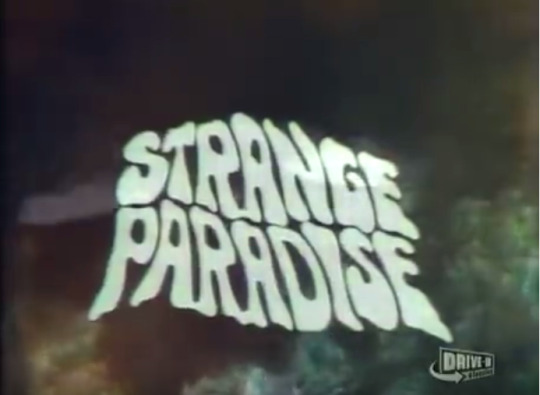
The obligatory first-episode title card screencap
The show opens on the fictional Caribbean island of Maljardin, which roughly translates to “garden of evil.” Jardin is French for “garden” and mal for “evil (noun).” Mal can also be used as an adverb to mean “badly,” but it is not an adjective. “Evil (adjective) garden” would be Mauvaisjardin, which doesn’t sound half as cool. The exterior shots are of Casa Loma, a mansion in Toronto surrounded by trees that look nothing like anything in the Caribbean, but I can forgive them because the Château de Maljardin is awesome both inside and out. I would say I want to live on Maljardin, but I don’t like the heat and I’m sure the air conditioning costs for the château are extravagant--and, although they never mention it on the show, you know that filthy rich and frequently overdressed Jean Paul Desmond would have had air conditioning installed.
Jean Paul Desmond (Colin Fox) is the master of Maljardin and he is grieving the death of his wife Erica (Lara Cochrane), whose body he is preparing to freeze in order to bring her back to life at some point in the future. Erica has apparently only just died, and he is already having his servant Quito (Kurt Schiegl) carry huge blocks of dry ice--with his bare hands (WTF?)--to line her coffin. Jean Paul must have spent a while preparing for this, and one wonders how far in advance he had to decide to do this, especially since he has already arranged for the Cryonics Society to professionally freeze her and they state in the first episode that he does not have a phone on his island. I’ve watched this episode three times and, each time I watch it, the whole situation seems a little more suspicious. But maybe he and/or Dr. Menkin (Joe Austin) predicted her death far in advance and planned accordingly? Surely a man as besotted with his wife as Jean Paul couldn’t have murdered her, right?

I love the scene where he makes his grand entrance carrying Erica. It's so extra. He's so extra.
I’m not speculating about all this because I don’t like Jean Paul, but rather because of certain clues in the narrative that might reflect a once-planned plot twist that writers after Martin ignored. (The keyword is might; I have no evidence that Martin was planning one, but one can always speculate.) In fact, I adore Jean Paul. His actor, Colin Fox, is the main reason why I’m obsessed with this show and can’t stop watching it. I have a huge crush on him thanks to this show, even bigger than my previous #1 crush, which was on King Henri III of France. Jean Paul is exactly my type: super-tall (he looks about 6′6″/2 meters), dark, handsome (more so when he’s not brooding), graceful, elegant, and very, very extra. He also has a beautiful voice, and I love listening to him talk. Yes, I know I’m attracted to him for mostly superficial reasons, but Jean Paul’s a fictional character, so does it matter? There are only a few problems with him, most notably some megalomaniacal tendencies:
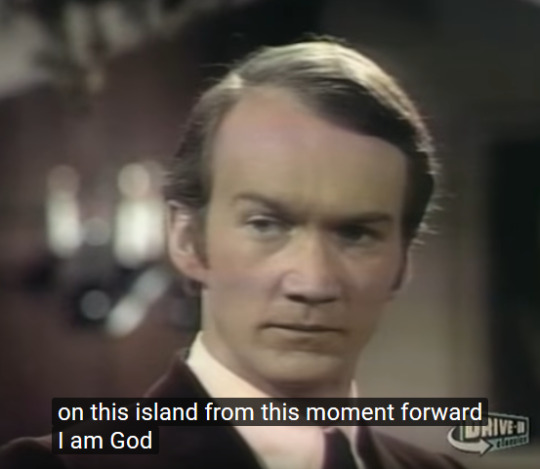
I suppose, though, that it’s inevitable to become somewhat of a megalomaniac when you own not just an isolated private island, but “a brokerage house, a department store, three newspapers, a football franchise, motion picture and television interests, and real estate holdings,” to quote another character. Jean Paul thinks that he can bring Erica back to life by spending millions of dollars on cryonics, which other characters--most notably his housekeeper Raxl (Cosette Lee)--insist is playing God. Only one other character approves, and he even applauds him for it:
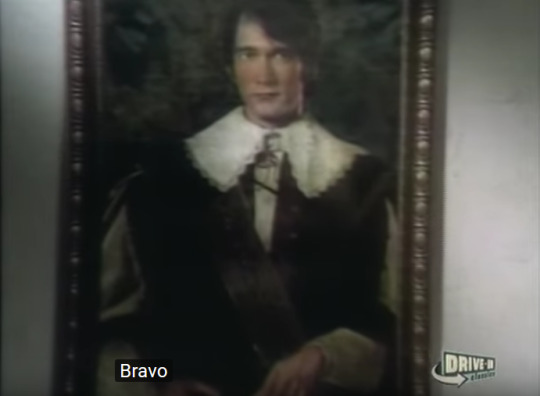
This is Jacques Eloi des Mondes, Jean Paul’s identical ancestor from the 17th century and my favorite character on this show. His surname literally means “of the worlds,” which I think is an awesome name for a character in an urban fantasy/horror series. According to Raxl, who is highly knowledgeable about both the des Mondes family history and the supernatural, Jacques Eloi des Mondes was THE DEVIL. (It is never clear whether she means this literally or figuratively.) He is also, in my not-so-humble opinion, the single hottest male character in the history of television. No exceptions. If you gave me the choice between Jacques and the entire cast of every other show in existence, I would choose him. He is charming, charismatic, seductive, and hilarious, at least in Ian Martin’s episodes. Most of the writers after Martin, however, ignore his superficial charm and focus instead on his evil, which Martin mostly only hints at. Anyway, Jacques talks through this portrait--a surprisingly good one compared to other “period” portraits from other shows and movies--which glows when his spirit talks to Jean Paul in this episode and which disappears when he (mild spoiler alert)
possesses him.
Jean Paul realizes that he and Jacques have a lot in common, including both having lost their wives at a young age. It is implied that he may even be a reincarnation of Jacques, who calls him “the man you are, the man you might have been,” before making him have a flashback to Jacques’ wedding reception three hundred years earlier. I will cover the flashback in another post, because, despite being only a minute and a half long, there is a lot to unpack and I want to critique the costumes in addition to analyzing the content. But I will say this now: Martin has Jacques mention “the cliff heights at sunset” in a rather ominous way, followed by a glance at the camera that suggests a much darker intent than just showing them to his bride:

This is the face of a very handsome man who is contemplating murder.
After this flashback, Jean Paul finds a glass of brandy in his hand that wasn’t there before: something which only Debby Graham’s synopsis mentions, but which is the first of many instances of Jacques literally making him drink. Jacques offers to resurrect Erica in return for Jean Paul setting him free, which involves finding his effigy in the crypt in the basement and removing a silver pin from its head. Jean Paul does this in a scene interspersed with clips of a singer performing a bad cover of “That Old Black Magic” (somewhere between slightly so-bad-it’s-good and David Wells on the sliding scale), and, as soon as he removes the pin from the doll’s head, Raxl freaks out because she senses what has just happened:

Jacques: *bows* “Bonjour!” *smirks as show cuts to brief shot of blank portrait* “The voodoo spell is broken.” *taps on doll’s head with pin* “I no longer have any need for you. Now...”

Raxl: "YOU DEVIL OUT OF HELL! OH! YOU FOOL! HOW DID YOU EVER BREAK THE SPELL THAT BOUND YOU TO-" *stops in archway and gasps*

Jacques: *in both Jean Paul’’s body and clothes now* "Why, what's the matter with you, Raxl?"
Jacques Eloi des Mondes, THE DEVIL, has possessed Jean Paul and is loose on Maljardin! And the episode ends shortly after.
While not one of the best episodes, the pilot is definitely interesting. The acting is somewhat campy and cheesy, especially in the flashback and in all of Raxl’s scenes, so this episode is definitely so bad it’s good. If you have read any of the synopses I linked to earlier in this article, it will be obvious that I didn’t write about everyone and everything in this episode (notably, I didn’t cover Alison and Dan’s scenes), but that is out of a desire to focus on Jean Paul and Jacques rather than a lack of interest. I do wonder, though: is this the first time that Jacques has spoken to Jean Paul? And just what is the true, original story behind Erica’s death?
{ <-- Previous: Introduction || Next: Episode 1, Part II --> }
#strange paradise#gothic soap opera#week 1#episode 1#maljardin arc#review#analysis#ian martin#cbs radio mystery theater#cbsrmt#conjure doll and silver pin#jacques making jean paul drink#magical costume change#on this island i am god#sliding scale of episode quality#speculation on ian martin's original story
1 note
·
View note
Video
youtube
Radio Drama: Speak of the Devil (CBS Radio Mystery Theater)
#RadioDrama#AudioDrama#OldTimeRadio#OTR#HorrorRetrospective#cbs radio mystery theater#Radio Play#Speak Of The Devil#Radio Mystery Theater#CBSRMT#Mystery Theater Episodes#Mystery Theater Full Episodes
0 notes